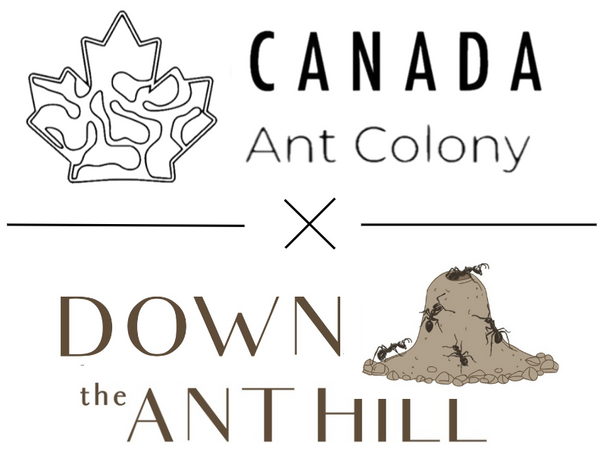I’ve been receiving a lot of requests lately about where to learn more about ants, so I decided to compile a reading list for those intrigued by their incredible world!
Ants exhibit some of the most complex and intriguing behaviors in the animal kingdom, from slave-making ants like Polyergus that raid colonies and enslave other ants to maintain their society, to agricultural ants like Atta and Acromyrmex, which practice sophisticated farming by cultivating fungus as their primary food source. There are also species with fascinating examples of ant medicine, where workers care for injured nestmates or use antimicrobial substances to protect their colony.
Much of the stuff I talk about in my videos is more recent research, and I provide further reading links at the bottom of the articles. That said, even just one of these books will give you an extremely strong baseline on understanding ant behavior.
These recommendations to contain affiliate links from Amazon, and I get a small (~4% kickback) from any purchases of these books you make through this website. However, this has had no influence on these rankings, and I have linked free versions were I was able to find them.
1. The Ants (Bert Hölldobler and Edward O. Wilson)

2. The Superorganism: The Beauty, Elegance, and Strangeness of Insect Societies (Bert Hölldobler and Edward O. Wilson)

3. Tales From The Ant World (Edward O. Wilson)

"Tales From The Ant World" is similar to "The Ants" by EO Wilson, with a bit more flare to his work. He describes different ant species across all different continents that he's documented, with a focus on the lives of 25 ant species, and how they fight to establish a place in the world. This book covers many of the more "charismatic" ant species, like leafcutter ants, fire ants, and army ants, through Wilson's personal account. Think of it like a more beginner-friendly version of "The Ants." Find it here
4. Adventures Among Ants (Mark Moffett)

5. Secret Lives of Ants (Jae Choe)

This book is very much a focus on the more mainstream parts about ants, condensed into a non-fiction but engaging narrative. The book covers parts of ant society reminiscent of our own, from ranching and farming, to their division of labor that early industrialization. "The Secret Lives of Ants" depicts a world much like ours under our feet, with amazing photographs and illustrations that introduce readers to the ant world. Find it here
6. Empire of Ants: The Hidden Worlds and Extraordinary Lives of Earth's Tiny Conquerors (Susanne Foitzik, Olaf Fritsche, Ayca Turkoglu)

7. Ants At Work: How an Insect Society is Organized (Deborah Gordon)

Compared to "The Ants," "Ants at Work" is a much more focused book. It covers Deborah Gordon's 17 years of studies on Harvester Ants in great detail, covering the lives of individual ant colonies she studied from when colonies first emerge, as they build nests, forage, raise new brood, and even fight wars against neighboring colonies, all the way until their natural deaths. It's a more narrative based, with insights into Gordon's frustration in the blistering Arizona Heat between the Chiricahua and Peloncillo mountains. Find it here
8. Ant Architecture: The Wonder, Beauty, and Science of Underground Nests (Walter R. Tschinkel)

"Ant Architecture: The Wonder, Beauty, and Science of Underground Nests" is a personal favourite of mine, although admittedly, it may not be the best place to start unless you have a specific interest in architecture. I studied it considerably in trying to figure out the designs of the ant farms I make in captivity. To me, this book represents a pure distillation of the scientific method. It steps you through each step of Walter Tschinkel's exploration into ant architrecture-- how ants move homes, how they decide to build their nests, and why ant nests are the shape they are. Get it here
9. The Leafcutter Ants: Civilization by Instinct (Bert Hölldobler and Edward O. Wilson)

Leafcutter ants are already one of the widely studied ant species. Being large scale herbivores and farmers, pioneering metal armor in ants, and fighting off mind-controlling fungi with the help of antibiotic bacteria. This book, by two of the most influential myrmecologists, covers everything about them. Need I say more?
You can buy it here
10. Army Ants: Nature’s Ultimate Social Hunters (Daniel Kronauer)

Army Ants are potentially one of nature's most awe-inspiring forces. Swarming through savannah and rainforest, they are the closest organisms to a hive mind. Their bodies create bridges, highways, and raid guard systems. They alternate between hunting and brood care phases, collectively clear and depopulate such wide areas that they are constantly on the move.
Get the book here
11. A Field Guide to the Ants of New England (Aaron M. Ellison, Nicholas J. Gotelli, Elizabeth J. Farnsworth, Gary D. Alpert)

12. Ants of North America: A Guide to the Genera (Brian L. Fisher, Stefan P. Cover)

One of the best introductions to ants in North America. This book will help you identify, to a great degree of accuracy, the ants you find in your backyard (assuming you, like me, are in North America. You can get it on Amazon here
